#mwoodsphotos: Absolute Beginners, Notting Hill... @mwoodsphotos at @BridgemanImages #children #London #photography #Poverty #homeless #children: image via Susan Israel @bondi_izzy, 6 January 2015
It was that verse about becoming again as a little
child that caused the first sharp waning of my Christian sympathies. If
the Kingdom of Heaven could be entered only by those fulfilling such a
condition I knew I should be unhappy there. It was not the prospect of
being deprived of money, keys, wallet, letters, books, long-playing
records, drinks, the opposite sex, and other solaces of adulthood that
upset me (I should have been about eleven), but having to put up
indefinitely with the company of other children, their noise, their
nastiness, their boasting, their back-answers, their cruelty, their
silliness. Until I began to meet grown-ups on more or less equal terms I
fancied myself a kind of Ishmael. The realisation that it was not
people I disliked but children was for me one of those celebrated
moments of revelation, comparable to reading Haeckel or Ingersoll in the
last century. The knowledge that I should never (except by deliberate
act of folly) get mixed up with them again more than compensated for
having to start earning a living.

Mothers and young children flock round an ice cream van in a back street in Hulme, Manchester: photo by Shirley Baker (9 July 1932 - 21 September 2014), 1965 via The Guardian, 8 October 2014
Today
I am more tolerant. It's not that I loathe the
little scum, as Hesketh Pearson put it; merely that 'the fact is that a
child is a nuisance to a grown-up person. What is more, the nuisance
becomes more and more intolerable as the grown-up person becomes more
cultivated, more sensitive, and more engaged in the highest methods of
adult work' (Shaw). I don't know about highest methods of adult work:
what makes the contest between them so unequal is that the child is
younger and so in better physical shape, life hasn't yet cut it down to
size, it's not worried about anything, it hasn't been to work all today
and hasn't got to go to work all tomorrow, all of which makes it quite
unbearable but for none of which can it fairly be blamed. The two chief
characteristics of childhood, and the two things that make it so
seductive to a certain type of adult mind, are its freedom from reason
and its freedom from responsibility. It is these that give it its
peculiar heartless, savage strength.
Philip Larkin (1922-1985): excerpts from The Savage Seventh (a review of Iona and Peter Opie: The Lore and Language of Schoolchildren, 1959), first published in The Spectator, 20 November 1959, reprinted in Required Writing: Miscellaneous Pieces 1955-1982, 1983

Two young girls swing on a rope attached to a lamppost outside a corner shop in Hulme, Manchester in the evening light: photo by Shirley Baker (9 July 1932 - 21 September 2014), 1965 via The Guardian, 8 October 2014

Islamabad, Pakistan. Afghan refugee girls sit in a hole in the ground, playing with a doll in a slum: photo by Muhammed Muheisen / AP via The Guardian, 4 January 2015

An Afghan boy in Pakistan plays with a kite: photo by Muhammed Muheisen / AP via The Guardian, 31 October 2014
An #Afghan #refugee #child child plays with a kite on the outskirts of Islamabad, #Pakistan, on Monday #childrenoftheday: image via Voice of Afghanistan @VoiceAfghan, 6 January 2015
An #Afghan #refugee #child girl washes a bed in a polluted stream, poor neighborhood on the outskirts of Islamabad #Pakistan: image via Voice of Afghanistan @VoiceAfghan, 6 January 2015
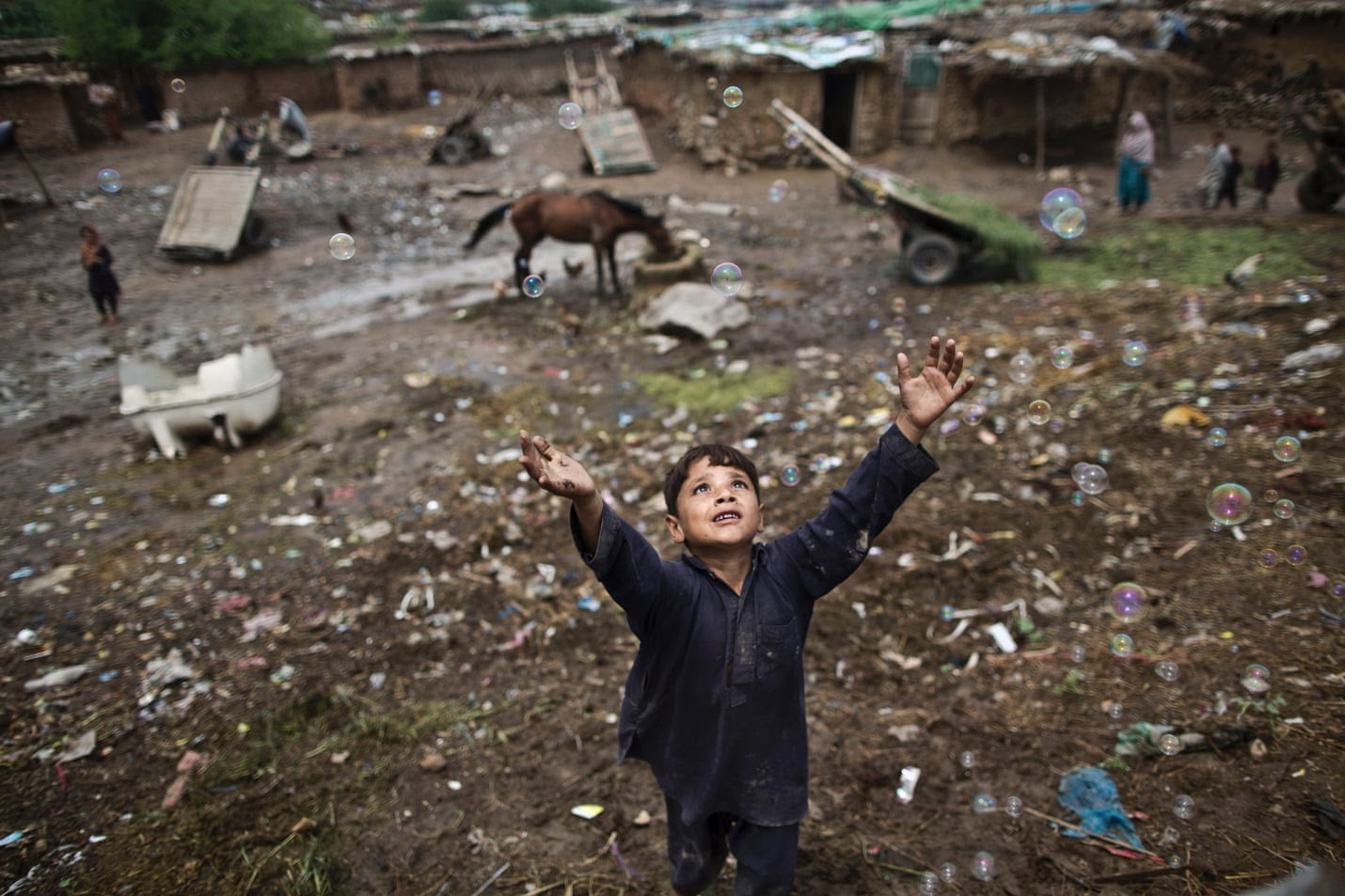
An Afghan refugee boy chases bubbles while playing on the outskirts of Islamabad, Pakistan: photo by Muhammed Muheisen / AP via The Guardian, 31 October 2014
A Yemeni boy walks past a mural reading ' Why did you kill my family' on Dec. 13, 2013 in the capital Sanaa #drones: image via Voice of Afghanistan @VoiceAfghan, 4 January 2015
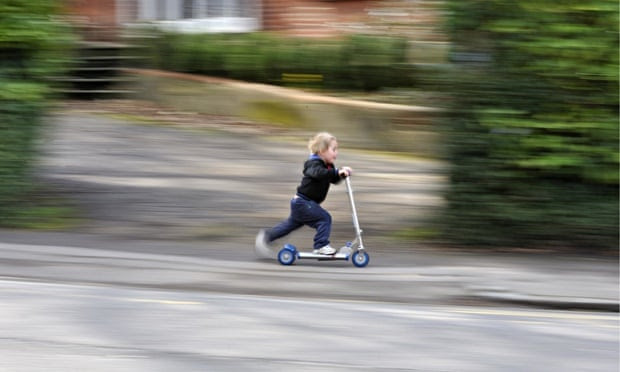
‘Every child under the age of 10 seems to be careering excitedly towards unsuspecting passers by, while a tired-looking parent vaguely attempts to assume some semblance of control’: photo by: DR Hutchinson/Getty via the Guardian, 29 December 2014

Family: photographer unknown, c. 1955 (Ben Evans Recreation Program Collection, Seattle Municipal Archives)

Two youths in Uptown, Chicago, Illinois: photo by Danny Lyon (b. 1942) for the Environmental Protection Agency's Documerica project, August 1974 (U.S. National Archives)

Three young girls on Bond Street in Brooklyn: photo by Danny Lyon (b. 1942) for the Environmental Protection Agency's Documerica project, July 1974 (U.S. National Archives}
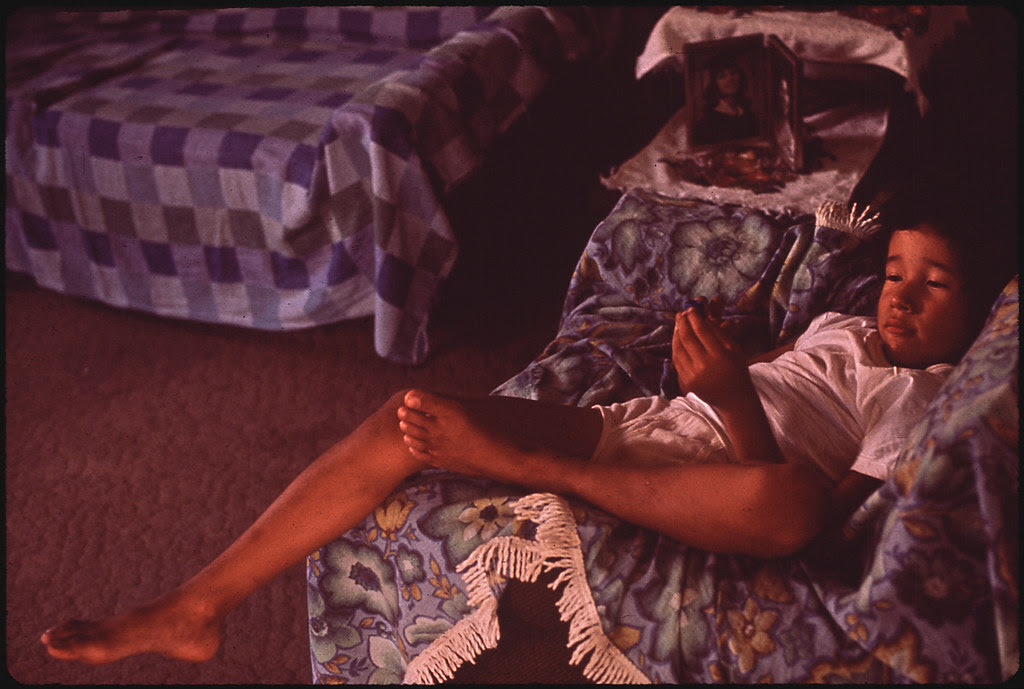
Chicano boy, Second Ward, El Paso: photos by Danny Lyon (b. 1942) for the Environmental Protection Agency's Documerica project, June/July 1972 (US National Archives)

School girl on street in North Philadelphia: photo by Dick Swanson (b. 1934) for the Environmental Protection Agency's Documerica Project, August 1973 (US National Archives)

Squatting Girl / Spider Girl with Green Car (New York): photo by Helen Levitt (1913-1909), 1980 via The Guardian, 24 October 2014


Girls in movie theatre with doll: photo by Weegee/International Centre of Photography via the Guardian, 9 January 2015

Two grinning boys, Manchester: photo by Shirley Baker (9 July 1932 - 21 September 2014), 1965 via The Guardian, 8 October 2014

Pupils from the Latymer School, London: photo by Jane Bown (1925-2014) for The Observer, 1963, via The Observer, 21 December 2014

Beatles fans in East Ham, London: photo by Jane Bown (1925-2014) for The Observer, 1963, via The Observer, 21 December 2014

In Room 34, Bablake School, Coventry: photo by allhails, 17 December 1954



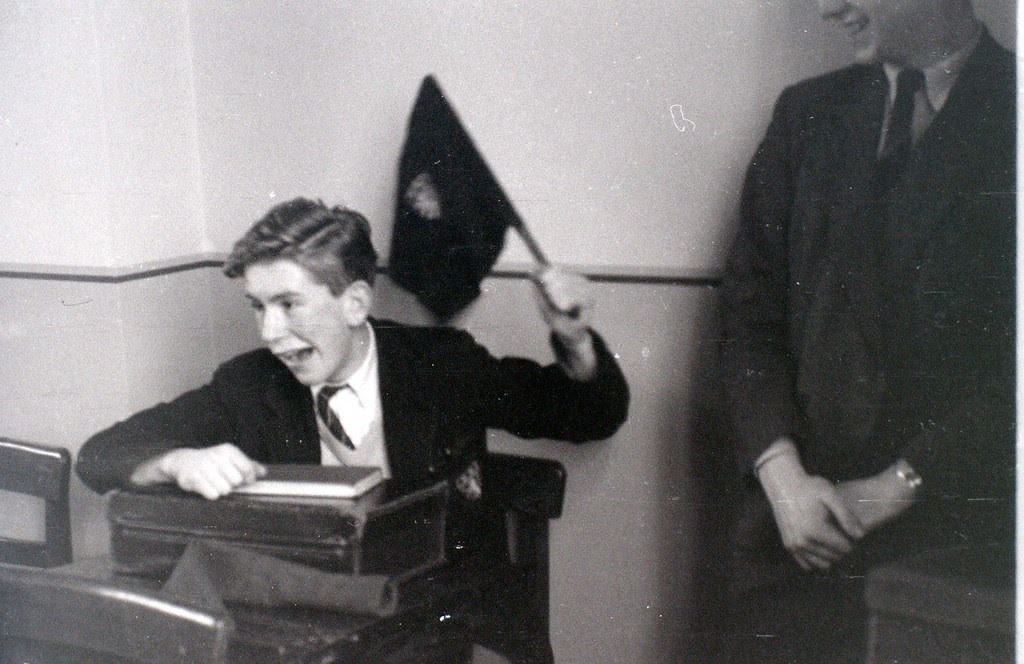
A quiet moment in Room 34, Bablake School, Coventry: photo by allhails, 17 December 1955

A quiet moment in class, Bablake School, Coventry: photo by allhails, c. July 1956

At Bablake School, Coventry. "Pip" Jones, one of the great characters in our school form: photo by allhails, c. July 1956

At Bablake School, Coventry: photo by allhails, mid-1957

At Bablake School, Coventry: photo by allhails, mid-1957
If I knew how to take a good photograph, I'd do it every time #RobertDoisneau #photojournalism #children: image via Mark Denham @DenhamMark, 5 January 2015

Salford, UK. Children playing outside in Broughton Green, as the late autumn sunshine casts shadows of a bare tree on their house: photo by Christopher Thomond for the Guardian, 3 November 2014

Afghan children during their madrassa, or religious school, in a mosque: photo by Muhammed Muheisen / AP via The Guardian, 31 October 2014

Islamabad, Pakistan. Afghan refugees and internally displaced Pakistani children attend their daily madrasa, or Islamic school, at a mosque on the outskirts of the capital: photo by Muhammed Muheisen/AP via the Guardian, 15 January 2015
#NewYear offers little chance for #children's #education in #Syria, warns UNICEF: image via UN News Centre @UN_News_Centre, 6 January 2015
#IslamicState #School Closures- 670,000 #Children deprived of Education #Refugees #Syria: image via World Relief Memphis @WRMemphis, 6 January 2015
RT @pn_antilogias: @FRANCE24: School attacks killed 160 #Syrian #children in 2014: UN image via semprecontro @semprecontro, 6 January 2015
This summer in #Lebanon in this and other villages we held camps for the #Syrian refugee #children: image via New Fields @NewFields, 5 January 2015

Beatles fans in East Ham, London: photo by Jane Bown (1925-2014) for The Observer, 1963, via The Observer, 21 December 2014

In Room 34, Bablake School, Coventry: photo by allhails, 17 December 1954

Bablake School, Coventry: Perkins and Weaver in a full and frank discussion: photo by allhails, 19 May 1955

At the fair, Hearsall Common, Coventry: photo by allhails, 30 May 1955

At Hearsall Common fair, Coventry: photo by allhails, 4 June 1955

A quiet moment in Room 34, Bablake School, Coventry: photo by allhails, 17 December 1955

A quiet moment in class, Bablake School, Coventry: photo by allhails, c. July 1956

At Bablake School, Coventry. "Pip" Jones, one of the great characters in our school form: photo by allhails, c. July 1956

At Bablake School, Coventry: photo by allhails, mid-1957

At Bablake School, Coventry: photo by allhails, mid-1957
If I knew how to take a good photograph, I'd do it every time #RobertDoisneau #photojournalism #children: image via Mark Denham @DenhamMark, 5 January 2015

Salford, UK. Children playing outside in Broughton Green, as the late autumn sunshine casts shadows of a bare tree on their house: photo by Christopher Thomond for the Guardian, 3 November 2014

Afghan children during their madrassa, or religious school, in a mosque: photo by Muhammed Muheisen / AP via The Guardian, 31 October 2014

Islamabad, Pakistan. Afghan refugees and internally displaced Pakistani children attend their daily madrasa, or Islamic school, at a mosque on the outskirts of the capital: photo by Muhammed Muheisen/AP via the Guardian, 15 January 2015
#NewYear offers little chance for #children's #education in #Syria, warns UNICEF: image via UN News Centre @UN_News_Centre, 6 January 2015
#IslamicState #School Closures- 670,000 #Children deprived of Education #Refugees #Syria: image via World Relief Memphis @WRMemphis, 6 January 2015
RT @pn_antilogias: @FRANCE24: School attacks killed 160 #Syrian #children in 2014: UN image via semprecontro @semprecontro, 6 January 2015
This summer in #Lebanon in this and other villages we held camps for the #Syrian refugee #children: image via New Fields @NewFields, 5 January 2015

Extreme #poverty drives #Afghanistan #children to work in odd jobs No school Stolen childhood: image via voice of Afghanistan @VoiceAfghan, 5 January 2015

Extreme #poverty drives #Afghanistan #children to work in odd jobs No school Stolen childhood: image via voice of Afghanistan @VoiceAfghan, 5 January 2015
This tiny tot is likely to become #PeshawarAttack militant. Pic: Taken from IS child camps near Mosul, Iraq. #children: image via Apurva #Apurvamahendra, 6 January 2015
How was 2014 for #Palestinian #Children? via @DCIPalestine #FREE_PALESTINE #ICC4Israel #BDS: image via Sam Fisher 6 @echelon, 5 January 2015
#Yemen armed #children belong to houthi militants in Hodida #city: image via Fuad Al-Hothefy @Fuad_PRYC, 6 January 2015
Are you sure that all #children are #innocent? I feel sorry for #future #generations this is what they call for #jihad: image via Yecidia @yezidia, 5 January 2015

Donetsk, Ukraine. A child holds a weapon outside a bombshelter that is used as accommodation by locals whose homes have been destroyed in shelling attacks: photo by Valeriy Sharifulin/ITAR-TASS Photo/Corbis via The Guardian, 22 December 2014

Kurdish children from the Syrian town of Kobani play at a refugee camp in the border town of Suruc, Turkey: photo by Osman Orsal / Reuters via The Guardian, 29 November 2014

Afghan refugees living in Islamabad: photo by Anadolu Agency via The Guardian, 1 December 2014

Mazar-i-sharif, Afghanistan. A child plays at a camp for internally displaced people. As winter sets in across the region, many Afghans struggle to provide adequate food and shelter for their families: photo by Farshad Usyan / AFP via The Guardian, 4 December 2014

Children, internally displaced due to fighting between rebels and forces loyal to the Syrian president, Bashar al-Assad, walk past tents at the Jarjanaz refugee camp in Idlib, Syria: photo by Khalil Ashawi/Reuters via The Guardian, 6 December 2014

A Syrian boy plays on a skateboard in Ankara, Turkey. Syrian refugees across the Middle East, some in exile for a fourth winter, face freezing temperatures, hunger and increasing hostility from locals as governments struggle to cope with the humanitarian crisis. Lebanon and Jordan are tightening their borders to stem the flow of those trying to escape, while in Turkey, widely praised for hosting around half of Syria’s estimated 3.2 million refugees, the influx threatens to upset the country’s delicate social balance: photo by Umit Bektas/Reuters via The Guardian, 6 December 2014

Gaza City, Gaza. A Palestinian boy looks out through a hole in his damaged family home: photo by Suhaib Salem/Reuters via The Guardian, 4 January 2015

Ahmadabad, India. Students pour water on each other as part of a ritual bath on the eve of Magh Purnima: photo by AP via The Guardian, 4 January 2015

Kabul, Afghanistan. An internally displaced child washes her feet at a hand pump as she and others wait for their parents to collect food relief aid from the World Food Programme: photo by Shah Marai/AFP via The Guardian, 14 January 2015
@Raqqa_SI: Syrian refugees #children going to school despite everything.
Atmeh camp, in Idleb, Idlib, #Syria: image via Maey @MaeyCat, 6 January 2015

Despite crying from the cold, Ibrahim, seven, seen here standing at the entrance to his shelter, has helped his father clear snow from the roof to prevent it collapsing. The refugee family in Lebanon’s Bekaa Valley have only a makeshift tent to protect them from the cold, with temperatures dipping below -5C (23F): photo by Ralph Baydoun/World Vision via The Guardian, 15 January 2015

A boy warms his hands by a fire at a makeshift garage in a camp in Arsal: photo by Maya Hautefeuille/AFP via The Guardian, 15 January 2015

A Syrian boy, right, looks out through the door of his snow-covered shelter in Deir Zanoun: photo by Hussein Malla/AP via The Guardian, 15 January 2015
#Pray for #Children and Give #charity #Syria: image via Sis Convince Me @SisConvinceMe, 5 January 2015

Suruç, Turkey. A Kurdish boy from the Syrian town of Kobani holds onto a fence that surrounds a refugee camp: photo by Yannis Behrakis / Reuters via The Guardian, 3 November 2014
# It's not #death [t]hat scares us, if we die 4 a better #life 4 our #children. What scares [us] is 2 die without meaning: image via geen Alhasan @GeenHasan, 6 January 2015
#syria #pain #children #world #storm Happy New real year Welcome in syria: image via ABD @mmoawea, 6 January 2015
#syria #pain #children #world #storm We were [to] have houses but after Alassad start[ed] a war we [have] been homeless for freedom: image via ABD @mmoawea, 6 January 2015

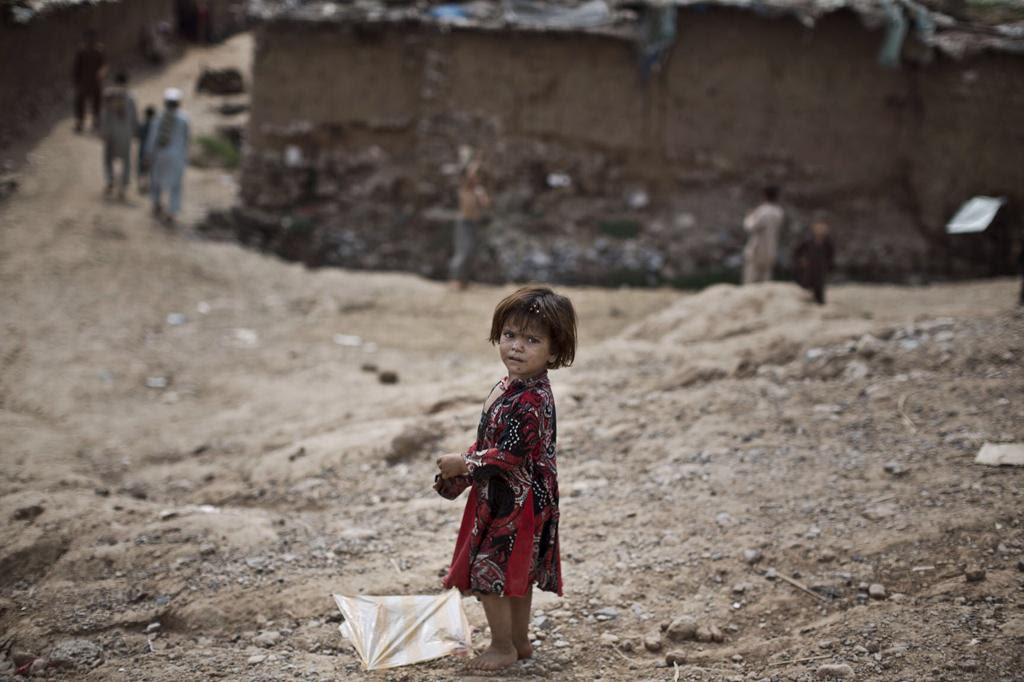
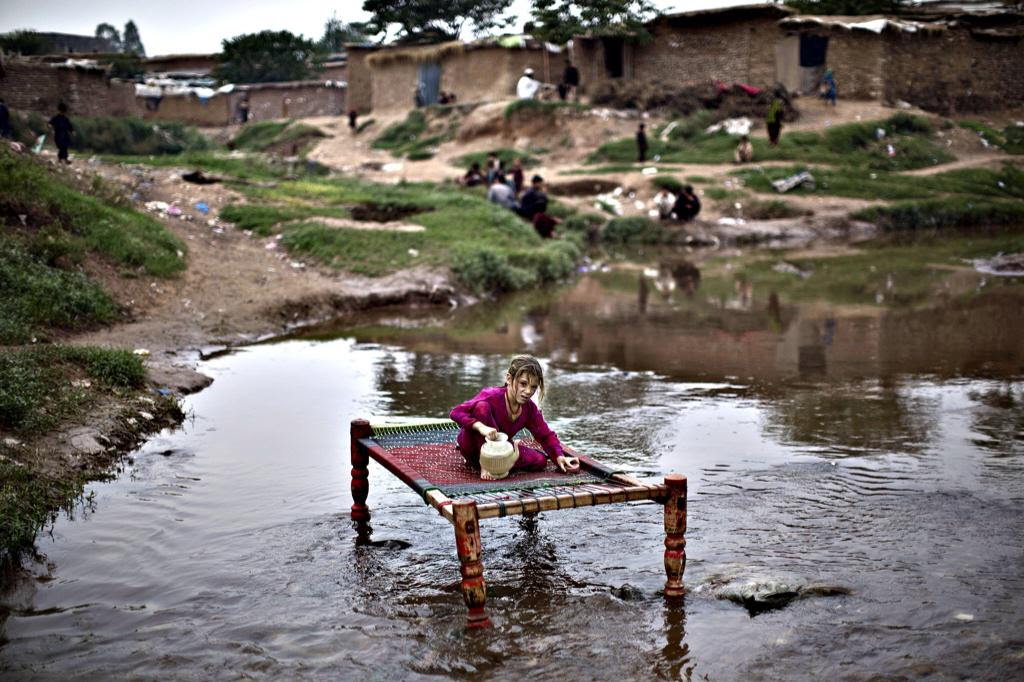
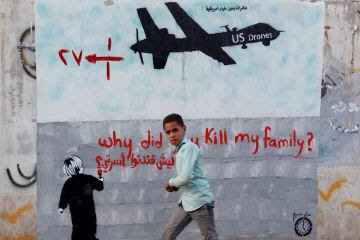
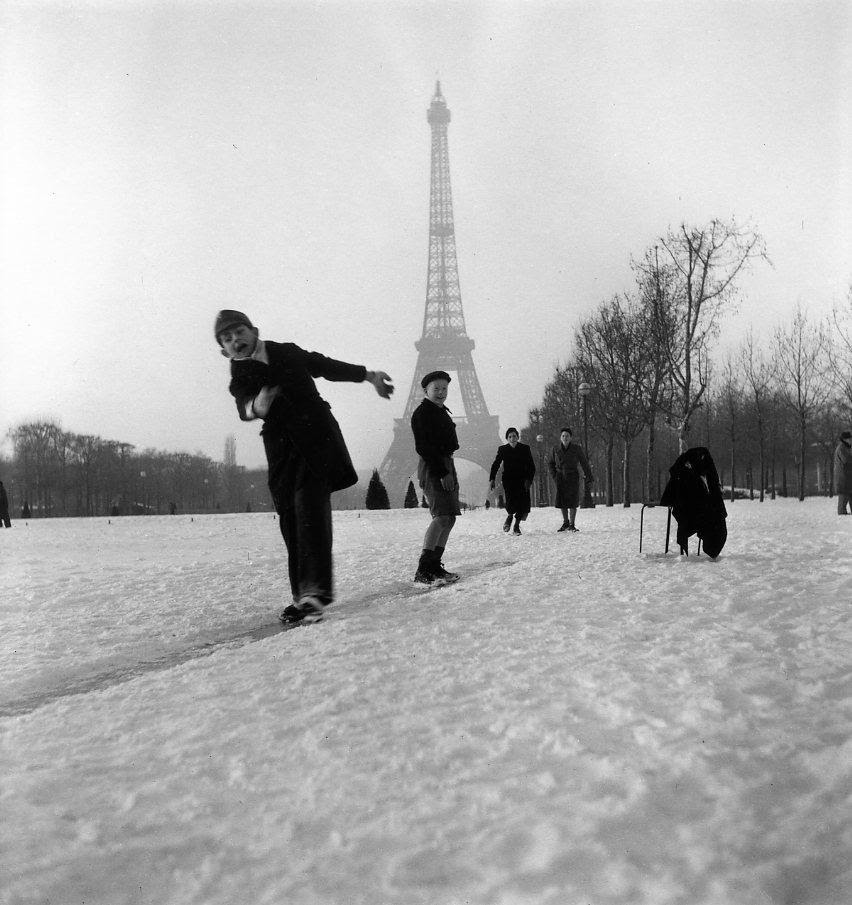
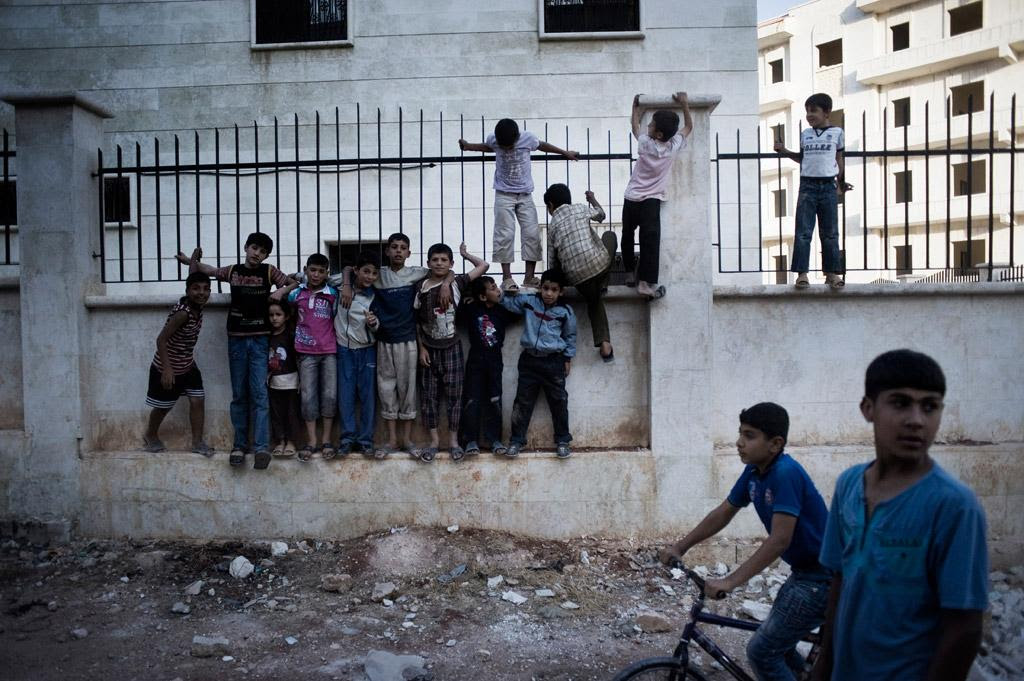
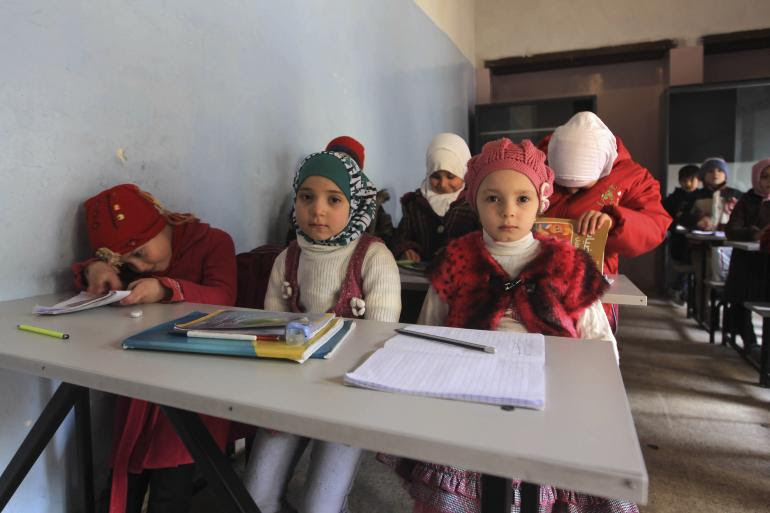




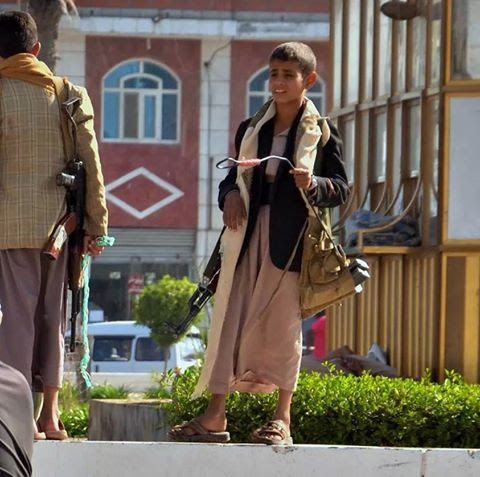




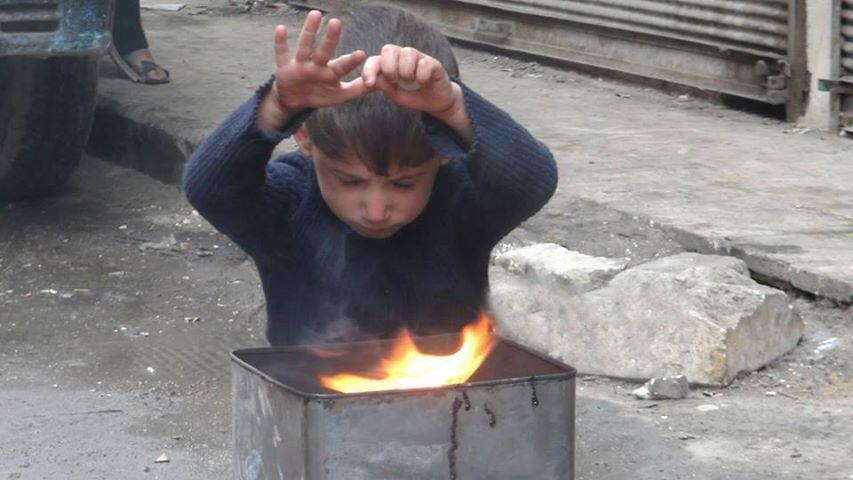




4 comments:
Tom,
Perhaps, stemming from the fragility that is inescapable in our case: that we tend to feel responsible for a lot more than we are; other than our own self I think the savagery of childhood is enjoyed by most till the day they die. However, the part about responsibility often fails to extend over the boundaries of self-provision. That, unfortunately is the truth. That we age, and we age despondently for everything that may be required of us. But we grow, only for ourselves.
Always thought the English were miserable sods when it came to kids! Couldn't but help think of the song of childhood from the Wim Wenders film.
Tom, this is the most gut-wrenching post you've put together so far, so painful to see, hearing in my inner ears their cries and calls and Blakean voices... (the chimney sweeper's cry/every blackening church appalls)... the hopeful/hopeless mix of innocence and experience... vividly here. So vividly... I"m a wreck. Thank you. (Somehow Larkin's honest but pissy remarks only heighten the poignancy you've concocted...)
Many thanks to everyone for thoughtful commentary, all quite apropos.
We all of us these days if we are sensitive souls are continually challenged by the overwhelming sense of empathy with human suffering we witness when confronted with images of the world in which we live, now, in real time.
That the innocence of childhood should in some places be stifled by the burden of a terrible and almost continuous experience of suffering is, as Abdal-Hayy says, almost too much to bear: the fact that the world we've made, and the world we will leave behind to the future, came to this.
Larkin's cranky, curmudgeonish against-the-grain approach to the subject of childhood has the virtues of, first, removing cuteness and sentimentality and cultural amour-propre from the discussion altogether, and perhaps more important, allowing us to see that savage strength, that resilience, that let's get-on-with-itness for the glorious thing it is.
Larkin himself grew up in Coventry, a few years earlier than the date of the sequence of English schoolboy candids that appear here.
Billoo refers to this cinematic scene, in which we see an angel (Bruno Ganz) walking invisibly through the streets of Berlin, with a voiceover text from Peter Handke (Lied von Kindseln). in Wim Wenders' film Wings of Desire (1987). Couldn't dig up a clip with English subtitles, sorry, but below the film link I'll give the Handke poetic text, translated:
Lied von Kindseln / Song of Chidhood (Peter Handke), voiceover recitation in Wim Wenders' Wings of Desire (1987)
Song of Childhood
By Peter Handke
When the child was a child
It walked with its arms swinging,
wanted the brook to be a river,
the river to be a torrent,
and this puddle to be the sea.
When the child was a child,
it didn’t know that it was a child,
everything was soulful,
and all souls were one.
When the child was a child,
it had no opinion about anything,
had no habits,
it often sat cross-legged,
took off running,
had a cowlick in its hair,
and made no faces when photographed.
When the child was a child,
It was the time for these questions:
Why am I me, and why not you?
Why am I here, and why not there?
When did time begin, and where does space end?
Is life under the sun not just a dream?
Is what I see and hear and smell
not just an illusion of a world before the world?
Given the facts of evil and people.
does evil really exist?
How can it be that I, who I am,
didn’t exist before I came to be,
and that, someday, I, who I am,
will no longer be who I am?
When the child was a child,
It choked on spinach, on peas, on rice pudding,
and on steamed cauliflower,
and eats all of those now, and not just because it has to.
When the child was a child,
it awoke once in a strange bed,
and now does so again and again.
Many people, then, seemed beautiful,
and now only a few do, by sheer luck.
It had visualized a clear image of Paradise,
and now can at most guess,
could not conceive of nothingness,
and shudders today at the thought.
When the child was a child,
It played with enthusiasm,
and, now, has just as much excitement as then,
but only when it concerns its work.
When the child was a child,
It was enough for it to eat an apple, … bread,
And so it is even now.
When the child was a child,
Berries filled its hand as only berries do,
and do even now,
Fresh walnuts made its tongue raw,
and do even now,
it had, on every mountaintop,
the longing for a higher mountain yet,
and in every city,
the longing for an even greater city,
and that is still so,
It reached for cherries in topmost branches of trees
with an elation it still has today,
has a shyness in front of strangers,
and has that even now.
It awaited the first snow,
And waits that way even now.
When the child was a child,
It threw a stick like a lance against a tree,
And it quivers there still today.
Post a Comment